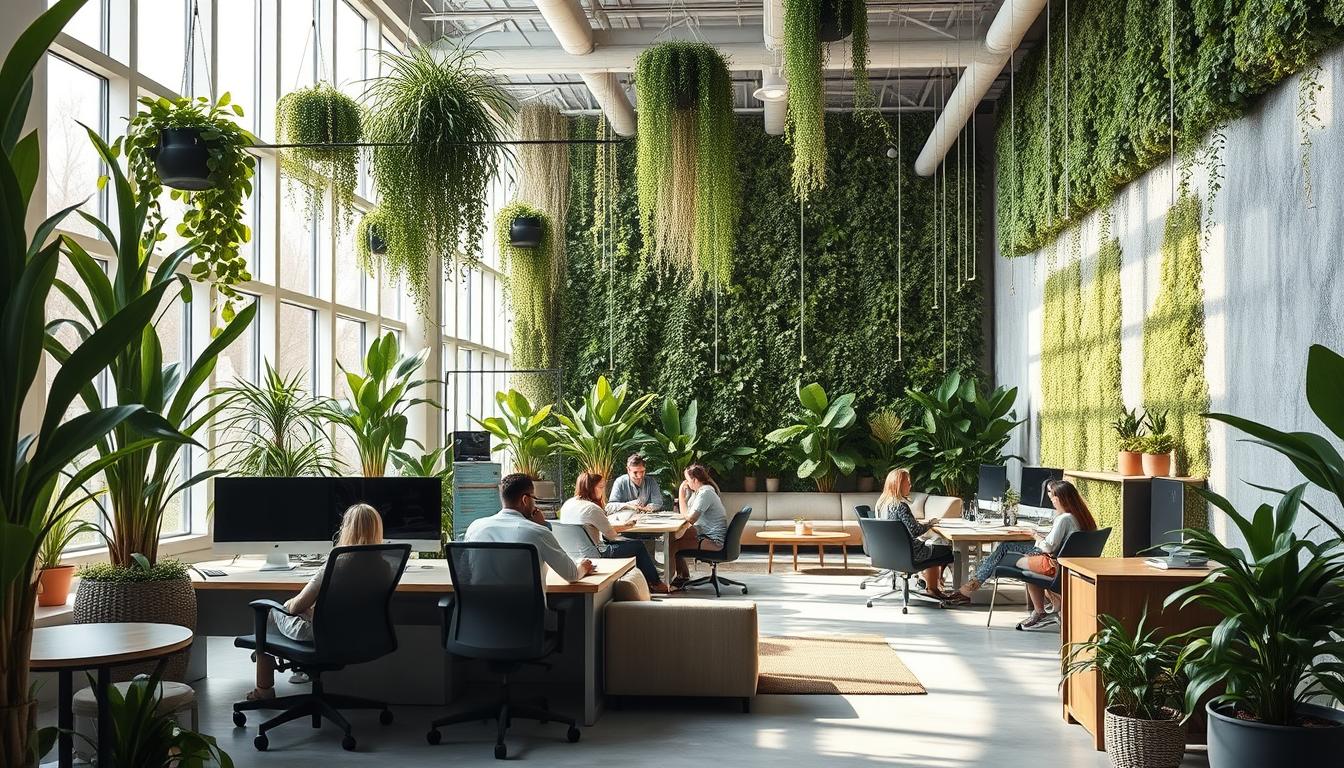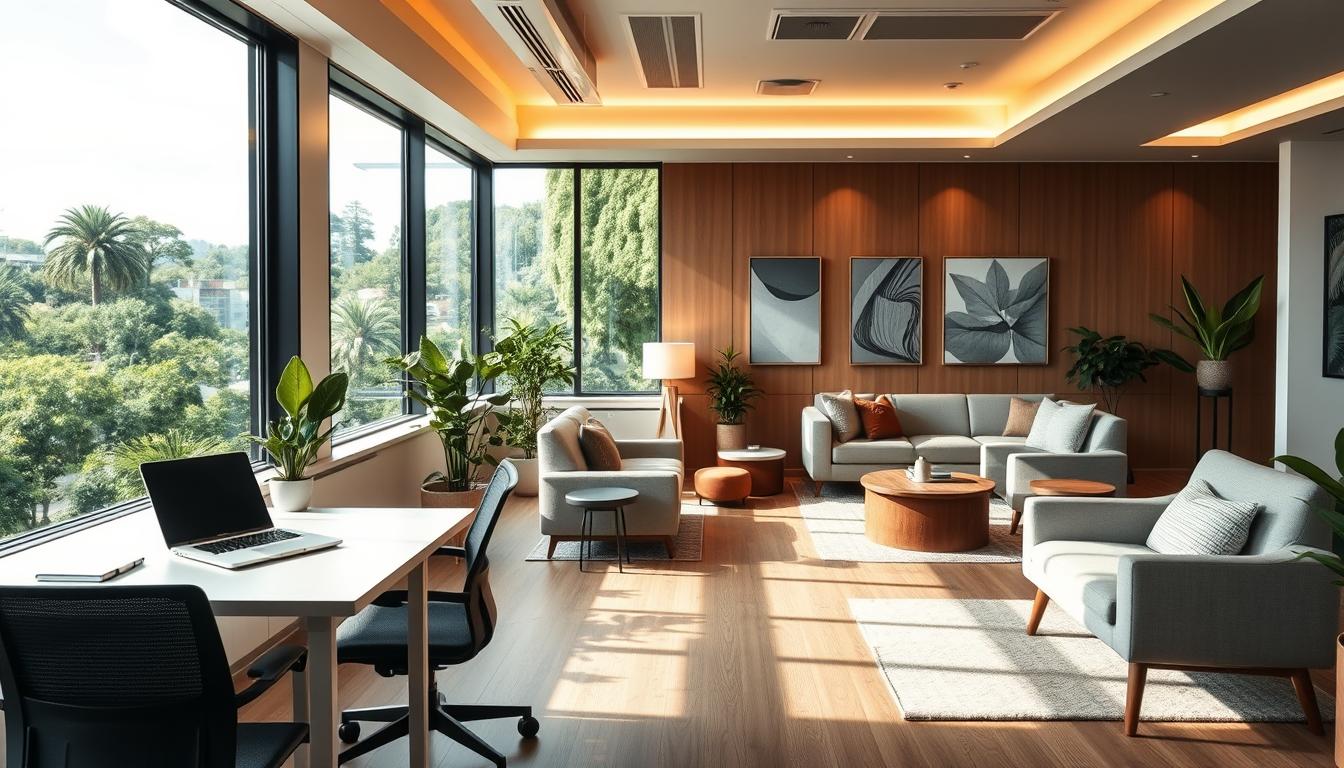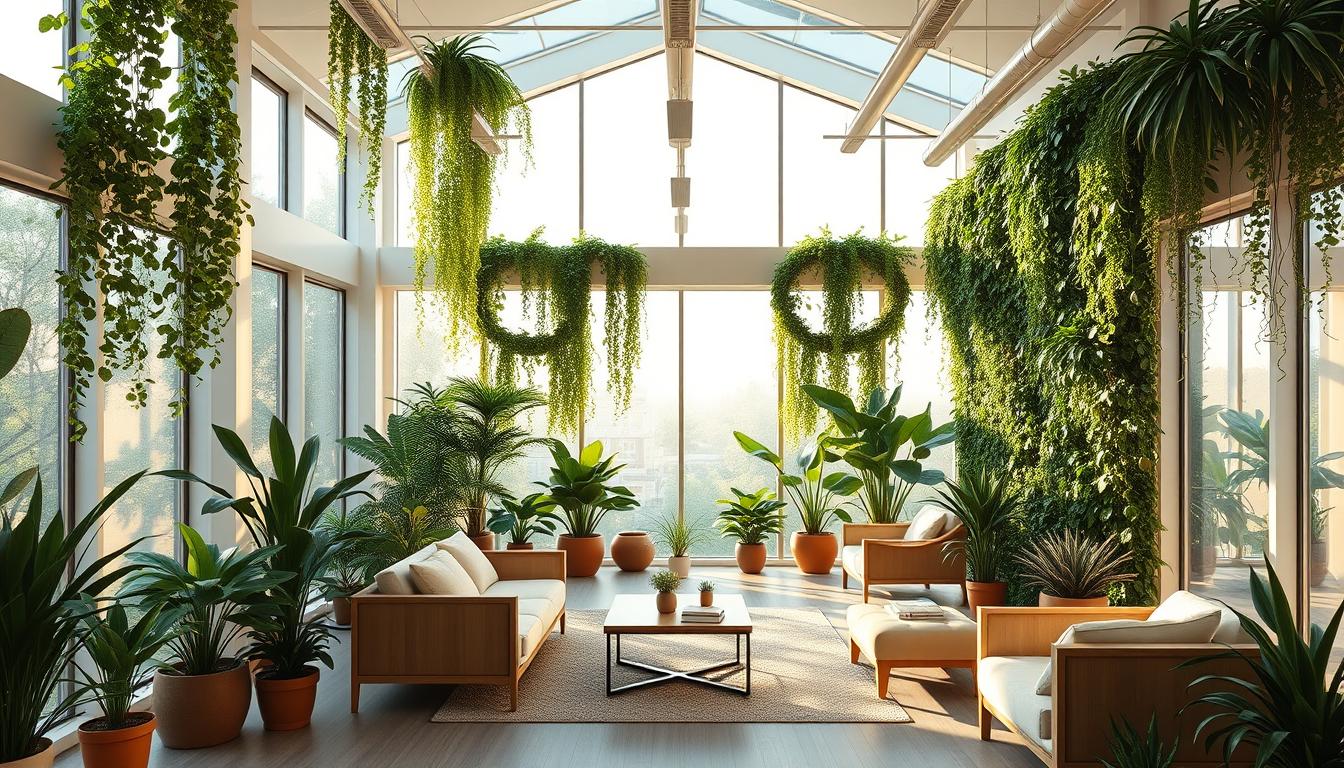Nowadays, office improvement is seeing big changes with workspace-integrated living walls, or green walls. These cool designs catch your eye and help make employees feel better and work harder. By adding green walls to offices, companies make their spaces look and work better.
Living walls bring many good things. They improve the air, lower noise, and make workers happier. More and more companies want healthy workspaces. So, vertical gardens are changing the way we think about and use office spaces.
Understanding Living Walls in Office Environments
Living walls are changing modern office spaces. They are beautiful and bring many benefits. These walls bring nature inside and help clean the air. They make workers feel better. Knowing about living walls helps in choosing them for offices.
Definition of Living Walls
Living walls are structures filled with plants growing up them. They can be indoors or outdoors, making spaces green and peaceful. They help make the office a better place. This makes workers happier and more productive.
Types of Living Walls
There are different kinds of living walls for different looks and needs. Here are some common ones:
- Modular Living Walls: These are panels with plants that are easy to put up and care for.
- Freestanding Walls: These stand on their own and can add green spaces anywhere.
- Palettes: They are vertical gardens that hold a mix of plants for a beautiful view.
- Hydroponic Systems: These walls grow plants without soil and are great for indoors with little upkeep.

The Aesthetic Appeal of Workspace-Integrated Living Walls
Workspace-integrated living walls turn plain offices into visually engaging spaces. They make interiors inviting and full of life. These walls become eye-catching points and improve the room’s vibe.
Creating Beautiful Visual Displays
Living walls present stunning visuals, mixing colors and textures. This mix boosts creativity and inspiration at work. They bring the outdoors inside, making people feel refreshed and positive. So, the look of your workspace changes, making work more exciting.
Enhancing Office Interior Design
Living walls add many perks to office design. They act as unique art, making spaces modern and stylish. Adding greenery softens hard surfaces for balanced beauty. This makes offices feel welcoming, lifting employee happiness. So, the charm of living walls is key in today’s office style.
Benefits of Workspace-Integrated Living Walls
Living walls at work offer many benefits. They make the office better by improving air, helping workers feel good and work better. These natural features add a lot to where we work.
Improving Indoor Air Quality
Living walls clean the air we breathe inside. They take in harmful substances from furniture and tech, then give out oxygen. This makes the air healthier, which is key for a good work space.
Boosting Employee Productivity
Having living walls boosts how much work gets done. Greenery sparks creativity and helps people focus, making work go smoother. Workers feel less stressed, which makes them more motivated and engaged.
Enhancing Mental Well-Being
Being around nature, like living walls, really helps our minds. Workers feel less anxious and happier. This makes the workplace nicer, helping everyone feel better about their job.
How Living Walls Act as Natural Air Purifiers
Living walls do more than just look pretty. They help clean the air, using plants to improve the air we breathe indoors. By understanding how they work, we can see their benefits in offices.
Understanding Photosynthesis and Air Filtration
Plants clean the air through photosynthesis. They take in CO2 and pollutants, and with sunlight, release oxygen. Living walls full of plants act like small ecosystems, constantly cleaning the air. This not only makes office air fresher but also healthier for those working there.
The Impact of VOCs in Office Spaces
VOCs come from things like paint and cleaning products. They can harm our health and make us less productive. Living walls combat VOCs by absorbing these harmful chemicals. The plants in these walls help keep the air cleaner and safer, making offices a better place to work.
Enhancing Acoustic Comfort with Living Walls
In today’s busy work environments, it’s key to have a calm space. Living walls bring an innovative way to boost acoustic comfort. By adding greenery to offices, these green walls help cut down noise. This makes the workplace more peaceful.
Reduction of Noise Levels
Living walls are great at soaking up sound. This helps lessen distractions in open offices. The plants and wall structure lower noise. This lets employees concentrate better. It also improves communication, which is key for teamwork.
Creating a Peaceful Work Environment
Living walls do more than just cut noise. They make the work atmosphere more calm. This calmness boosts job satisfaction and productivity. Being around nature, workers feel less stressed. This helps them focus and work well together.
Biophilic Design: Integrating Nature in Workspaces
Biophilic design strengthens the bond between built environments and nature. It aims to boost well-being through natural elements. Nature integration is key, creating serene and outdoor-connected spaces. This method shows that being close to nature can improve mental health and work productivity.
Definition and Principles of Biophilic Design
Biophilic design focuses on natural light, organic materials, and greenery. Its aim is to create comfortable, engaging environments with nature’s touch. Features like windows that open and workspaces with nature views are used. These efforts lead to more creativity and less stress for employees.
Role of Living Walls in Biophilic Design
Living walls are crucial in biophilic design, adding beauty and function to offices. They improve air quality and reduce noise. Adding living walls brings greenery to cities with little ground space. This method deepens nature’s role, boosting aesthetics and health benefits in biophilic spaces.
Optimizing Space with Vertical Gardening Solutions
In cities where room is scarce, vertical gardening is a smart fix for sprucing up office spaces. It lets you add plants without needing lots of ground space. Plants grow up instead of out, using the available vertical area well.
Advantages of Vertical Orientation
Going vertical with gardens offers many perks:
- Maximized Space: It allows for more greenery in offices without taking up much floor space.
- Aesthetic Appeal: Living walls make office spaces lively and more pleasant.
- Improved Air Quality: More plants mean better air quality indoors.
Maximizing Limited Office Space
Adding vertical gardens to small offices boosts both looks and use. This method helps businesses to:
- Turn bare walls into spots full of green.
- Make the workplace more welcoming and spark creativity.
- Use new systems that simplify taking care of plants.
Choosing the Right Plants for Your Living Wall
When setting up a living wall in an office, pick plants that do well. You want plants that are easy to care for. This makes them blend smoothly into the office without needing lots of time or work. Below, we share some top choices that are great for indoors.
Low-Maintenance Plant Options
Choosing low-maintenance plants means your living wall will be easy but vibrant. The plants to think about include:
- Pothos: It’s tough, does fine in dim light, and doesn’t need much water.
- Spider Plant: It adjusts to many indoor spots, grows with little fuss, and likes an occasional trim.
- ZZ Plant: Loved for its shiny leaves, it’s okay with being ignored and grows in dim light.
- Snake Plant: It stands out, rarely needs water, and handles tough indoor spaces well.
Plants That Thrive in Indoor Conditions
Selecting plants that do well with little sunlight and moisture helps ensure your living wall succeeds. Plants like Fiddle Leaf Fig, Dracaena, and Peace Lily are good for office spaces. They don’t just look good; they also make the air better, creating a nicer environment.
Installation and Maintenance of Living Walls
Starting a living wall project involves a few key steps. First, you need a well-thought-out plan. This ensures your living wall looks good and works well. The right installation helps living walls last longer in places like offices.
Steps to Install a Living Wall
First, check your space to pick the best spot for your living wall. Think about how much light it gets, the type of wall, and what’s around it. Then, choose plants that will do well in that location. You need a strong support system for the plants, like modular panels or vertical green systems. Also, make sure you have good watering and lighting setups for your plants.
Maintenance Tips for Longevity
Keeping your living wall healthy requires regular care. Here are some top maintenance tips:
- Monitor moisture levels to prevent over or under-watering.
- Prune plants to encourage growth and remove dead foliage.
- Check light conditions periodically to guarantee optimal sunlight exposure.
- Fertilize the plants seasonally according to their specific needs.
- Inspect the support system regularly for any signs of wear or damage.
Case Studies: Successful Implementations of Living Walls in Offices
Living walls are becoming very popular in big companies. They help make the workplace better. Case studies show these successful implementations. Companies like Amazon and Microsoft added living walls to their offices. They saw good effects on employee happiness and creativity.
Examples from Notable Companies
Amazon changed parts of its headquarters with living walls. This made green, lively areas where workers feel relaxed and get new ideas. They became more productive. Microsoft also added a beautiful living wall. It helps workers feel connected to nature, even in the city. This wall makes the office look better and helps people start conversations.
Feedback from Employees and Management
Workers love the living walls and feel happier at work. They feel part of a community. The greenery helps them work together better. Bosses see happier, more creative teams. These stories show how adding nature to workspaces can really help.
Conclusion
Adding living walls to workspaces is a groundbreaking move. It greatly improves work areas both in looks and function. Companies aiming to upgrade their workspaces find that living walls boost air quality and cut down noise. They also help employees feel closer to nature, which is vital for their happiness at work.
The decision to use living walls leads to workspaces filled with greenery. This encourages team members to be more creative and work well together. As interest in designs close to nature grows, businesses see the value of these green features. They play a big role in making work environments healthier.
Putting money into living walls shows a commitment to looking after employees’ well-being, both physically and mentally. Bringing the natural world into the office helps businesses do well. It creates a place where people can be productive and come up with new ideas. This sets the stage for a company’s success in the future.



